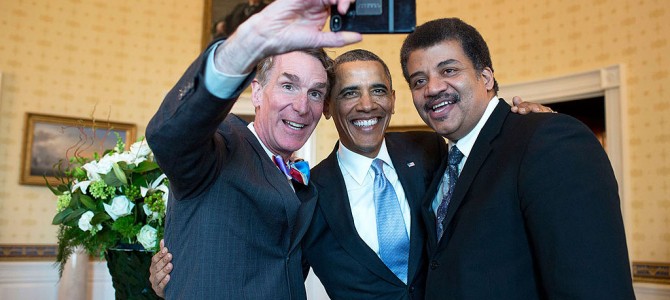
I have to admit that I missed out on the ascendancy of Neil deGrasse Tyson. In my era, the nation’s beloved “scientific communicator” was Carl Sagan.
And he had many of the same flaws. As I’ve written about elsewhere, Sagan spoke eloquently about need to follow the evidence wherever it goes, without regard for your own preconceptions or ideological preferences. Then he bowed to his own preconceptions, declaring that industrial civilization must be destroying the earth, it’s just that we don’t know whether it’s going to bake the globe or freeze it. (This was back when the doomsayers were making their transition from global cooling to global warming.)
So we had an advocate of the method of science who adopted the worst intellectual model of all, the method of modern journalism: decide on the story first, then gather the facts.
Neil deGrasse Tyson is Carl Sagan 2.0, down to the fact that he’s been cast as the host in a reboot of Sagan’s “Cosmos” miniseries. As usual, though, the copy loses some quality from the original. It’s as if they took Sagan and decided to decrease the earnest thoughtfulness while increasing the preening vanity and smug condescension.
In the past week, The Federalist‘s Sean Davis has caught Tyson in a series of convenient fabrications, misattributions, and obvious errors. See here, here, and here. The common denominator is a tendency to construct stories that make Tyson—and, by extension, his fans in the audience—seem smart and sophisticated, while making his straw man opponents, particularly politicians on the right, look bumbling and ignorant.
Even more disturbing is the defense you hear from Tyson himself and from his legions of fans: that the accuracy of the quotes doesn’t really matter, they’re just convenient illustrations to get attention, get people thinking, and promote his pro-science message.
But there’s the rub, isn’t it? How do you promote a pro-science message by saying that the facts don’t really matter?
There are all sorts of areas of life where we’re willing to let strict accuracy slide. We understand, for example, that “House Hunters” stages some of the house-shopping it shows us, that we’re not seeing truly authentic reality TV, if such a thing exists. And we don’t care, because it’s irrelevant to why we watch the show. (We watch it because, from the time Europeans first set foot on American soil, real-estate speculation has been our national pastime and favorite spectator sport.)
But strict fidelity to facts is not incidental to the reasons we talk about science and attempt to promote it. It is central to the whole endeavor.
Science is as science does. To talk loudly about fidelity to facts, while borrowing the journalists’ mantra of “fake but accurate,” sends the message that facts don’t really matter. What matters is the theater of being pro-evidence and pro-science and of looking down on your opponents as ignorant, anti-science dolts.
If Tyson seems bemused about criticism of his fabrications and doesn’t take it seriously, he’s telling us that he sees himself as a showman. We’re not supposed to ask whether the events he talks about are real, fictional, or embellished, we’re just supposed to enjoy the show.
It’s that crucial scientific principle of suspension of disbelief.
But then science becomes a show driven by the preservation of a narrative, not by the pursuit of the facts.
So what harm does it do if Tyson makes up stories to fit his rhetorical needs? As an elite celebrity scientist who gets plum appointments, attracts a cult of personality, and hobnobs with presidents, he sets the tone for the rank and file on issues that do involve scientific substance.
Take a recent blog post from climate scientist Kate Marvel, of Lawrence Livermore National Laboratory and more recently NASA, in which she proclaims, “I Am So Bored with the Hiatus.” The “hiatus” refers to the failure of global temperatures to warm significantly since the mid-1990s.
I’m not sure anything could better capture the adolescent, “be one of the cool kids” style of the Neil deGrasse Tyson era than to proclaim oneself “bored” and like-soooo-over-this about facts that don’t fit your favored scientific theory. The only way to top this would be to write it in emojis.
In fact, the “hiatus” is a really big problem for claims that mankind’s industrial production is causing the planet to heat up. Historical temperature records show a slight decline in global temperatures from roughly 1940 to 1970, which is why some scientists in the 70s were predicting a new ice age. By 1980, there was some wavering between predictions of global cooling and predictions of global warming, but warming won out and hit the height of its vogue in the late 1980s and the 1990s—not coincidentally, during a sustained period of slightly increasing temperatures. But global temperatures have now been flat for almost as long as they were rising.
The Climategate e-mails show that this has been a topic of great concern in private discussions among the warmists, with one of them asking his colleagues, “where the heck is global warming?… The fact is that we can’t account for the lack of warming at the moment and it is a travesty that we can’t.” They knew that they had hung their argument on rising surface temperatures, and they knew that they couldn’t explain the recent stasis in those temperatures.
But evidence that challenges the prevailing theory bores Kate Marvel, who brushes it off by declaring: “No serious scientist truly believes that the slowdown in surface warming invalidates greenhouse physics.”
This is utterly superficial. The basic physics of the greenhouse effect are not the issue here. At issue is a whole series of more complex questions: whether the increase in atmospheric carbon dioxide is mostly attributable to human beings, whether that increase produces a large enough greenhouse effect to warm the planet, and whether any effect from carbon dioxide (which is actually a very weak greenhouse gas) might be offset by the enormous number of other factors in an extremely complex system. So to cite basic physics—a common trope of the warmists—is a glib and irrelevant answer.
Marvel goes on to assert that the pause in warming can be explained by “a massive increase in ocean heat content.” Well, all right, I suppose this is a plausible theory. But it is also a very new one—and only one of 52 different theories offered to explain the hiatus.
It also faces certain difficulties, included the fact that it is only very recently—since about 2000—that we’ve had a large, accurate network of sensors for measuring the temperature of the oceans, which makes precise measurement of historical trends impossible. Then there’s the fact that the amount of heat supposedly stored in the oceans might seem enormous, until you recall how huge the oceans are. This vast amount of energy results in an actual temperature increase of perhaps 0.09°C over the past 55 years—which seems a whole lot less dramatic.
That, plus some studies indicate that the warming of the oceans might be exaggerated, and that the deep oceans, where most of the heat is stored, are cooling. Then there’s the fact that, as Georgia Tech Professor Judith Curry points out, “even if the heat from surface heating of the ocean did make it into the deep ocean…it is very difficult to imagine how this heat could reappear at the surface in light of the 2nd law of thermodynamics.” The Second Law of Thermodynamics tells us that heat will always tend to disperse from a more concentrated form to a less concentrated form, which implies that heat diffused throughout the vast mass of the world’s oceans is not going to magically re-concentrate itself at the surface.
Oh, and then there’s the fact that at no time up to now have global warming alarmists been telling us, “heat in the oceans is the only thing that’s really important, so just ignore surface temperatures.” They only started telling us to ignore surface temperatures when that became necessary to protect their theory.
The point isn’t just that this smacks of an ad hoc rewriting of global warming theory. The point is that it is all presented, not as an attempt to take seriously the challenges to a scientific theory, but as a snarky dismissal of such challenges. Here is how Kate Marvel expresses this attitude.
Look, sometimes the ocean takes up more heat, and sometimes the atmosphere does. This is because the climate system is complex—so complex that people literally do nothing all day but study how the air and water on Earth slosh around and interact with each other. These pitiable people are called scientists, and despite their questionable life choices they are really pretty sharp. While they no doubt appreciate being reminded of the hiatus by you, [Wall Street Journal] writer/internet commenter/angry uncle, you may rest assured that they are aware of it, perhaps even more so than you!
There’s a lot of grounds for amusement here, especially considering how hard it was, until just a few years ago, to get anyone on the warmist side to admit to a pause or hiatus, which they now peevishly insist they were very much aware of all along, thank you very much. Or the fact that you can find a lot of reasons to be skeptical about the ocean temperature theory from scientists like Judith Curry, who is one of those people who “literally do nothing all day but study how air and water on Earth slosh around an interact with each other.”
But the point of the whole thing is to write off anyone who even mentions the mysterious absence of global warming as someone who has, in Marvel’s words, “decided to sever all ties with reality” by, you know, mentioning relevant facts.
Here we see, in action, the signature scientific style of the Neil deGrasse Tyson era. Present a scientific theory in crudely oversimplified form, omitting any uncertainties or counter-arguments. Pass off complex claims as if they are obvious “basic physics.” Then dismiss any skepticism as the resentment of the primitive, ignorant, unscienced masses against their enlightened betters.
It’s not a very good way to get valid scientific results—nor, for that matter, to promote the scientific method. But it’s what we get when we substitute, in place of respect for the actual methodology of science, an attitude of superior posing and smug condescension.
Follow Robert on Twitter.









